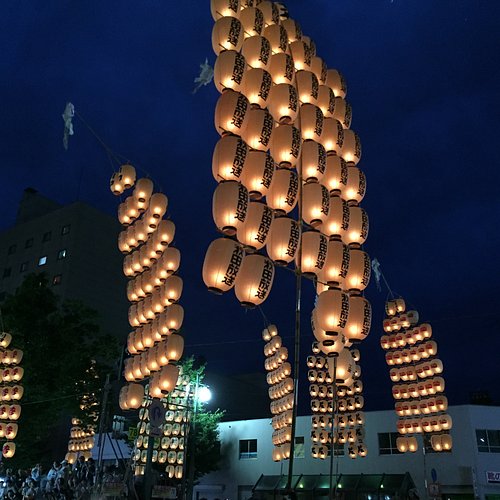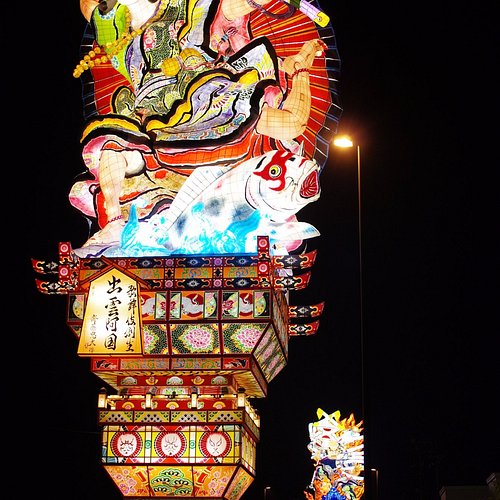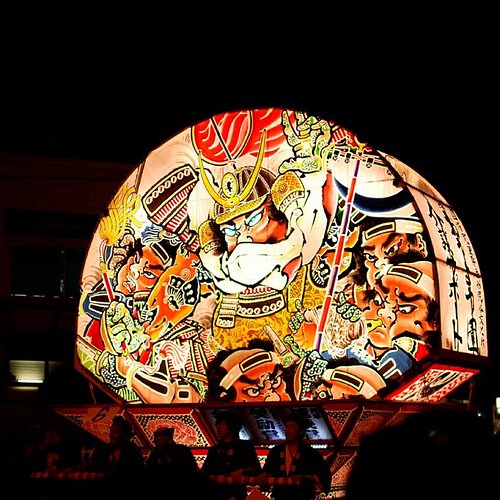10 Events in Tohoku That You Shouldn't Miss
The Tōhoku region (東北地方, Tōhoku-chihō), Northeast region, or Northeast Japan consists of the northeastern portion of Honshu, the largest island of Japan. This traditional region consists of six prefectures (ken): Akita, Aomori, Fukushima, Iwate, Miyagi and Yamagata.
Restaurants in Tohoku
1. Akita Kanto Festival
Overall Ratings
4.5 based on 105 reviews
The Kanto, or "Pole Lantern", Festival is held from August 3-6. Performers take to the street en masse to show their skill in balancing bamboo "kanto" poles. Each pole, which can be up to 40 feet tall and 90 pounds in weight, has paper lanterns tied to its top-- all with a real, lit candle inside! Entertainers are expert in wielding these, and when the Night Parade takes over the festival's main street, over 250 kanto poles light the area, and a 90-minute show gets underway. Energy is high as drums, flutes, and a crowd chanting "dokkoisho!" accompany the performers as they heft aloft the kanto. Afterwards, guests are welcome to give it a try themselves.
2. Aomori Nebuta Festival
Overall Ratings
4.5 based on 104 reviews
The Nebuta Summer Festival (or Matsuri) that takes place in early August every year in Aomori is quite simply one of the most unforgettable and unique street parades in the world. Local teams work each year to build 24 huge floats using wire frames covered with washi paper that sometimes represent Japanese gods and mythical creatures, but also historical figures and the contemporary actors that play them in Kabuki theatres and on Japanese TV. These intricately crafted sculptures are then lit from the inside with thousands of colourful lights and paraded each night around a 3km loop in the town of Aomori. Thousands of people take a part in carrying the floats, parading with taiko drums, flutes and cymbals, and dancing in traditional costumes chanting Rassera! Rassera! It's breathtaking to watch the vivid, colourful floats weaving at night through the throngs of musicians and dancers and you can find your own spot or reserve seating to enjoy it all. But that's not all. Anyone, regardless of age or ability, is invited to join in as long as they are wearing the traditional haneto dancing costume (which can be rented for about $30 from shops all over Aomori). Unforgettable!
3. Goshogawara Tachineputa Matsuri
Overall Ratings
4.5 based on 50 reviews
The Taichineputa no Yakata festival, held in Goshogawara every August, features vast 'taichineputa': glowing parade floats nearly 80 feet tall and weighing in at about 38,000 pounds! People help to shoulder the floats throughout the city, while dancers and musicians energize onlookers with chants and riffs. It's a high-energy and visually stunning parade, with about fifteen floats in total-- three of which are larger than life.
4. Hachinohe Sansha Taisai
Overall Ratings
4.5 based on 33 reviews
The summer festival of Hachinohe Sansha Taisai is historic to is prefecture, having been celebrated for over two-hundred years. The festival is characterized by a parade of large, intricate floats with images from myth and history. These floats are unique, in that along with being massive constructions, they are also mechanized: with floating dolls, moving parts, and even valves that release smoke. Over 25 floats are accompanied by dancers performing traditional renditions of the lion, tiger, and bamboo leaf dances, along with flute and drum music. The festival takes place July 31st-August 4th.
5. Hirosaki Neputa Matsuri
Overall Ratings
4.5 based on 53 reviews
Presented on August 1st-7th, the Hirosaki Neputa festival brings Japanese folk-culture to life. Massive floats are painted with scenes from the country's mythologies and history in a traditional style, then illuminated from the inside so that they glow a brilliant yellow-orange. The floats are then paraded through the city are night, to the sound of taiko drum beats and fluttering notes on the flute. Some areas of the city also dedicate themselves the to past during this time, with tea houses opening their doors and shamisen music on the air.
6. Noshiro Huyajou
Overall Ratings
4.5 based on 26 reviews
Noshiro Tanabata Festival "Tenku no Fuyajo" is a parade of Japan's dreamiest floats. Gigantic lanterns, over fifty feet in height, are constructed to resemble ancient, multi-tiered castles, and breathtaking shapes. The paper is dyed to give their glow spectrum of rainbow colors. Like something out of a fairy tale, their procession is accompanied by the gravitas of taiko drums, which blare out into the night air, adding to the spellbinding quality of this unique parade.
7. Yamagata Hanagasa Matsuri
Overall Ratings
4.5 based on 29 reviews
Hanagasa is the word for 'flower hat' in Japanese. At the Yamagata Hanagasa festival, over 10,000 dancers with beautiful traditional straw hats decorated with the prefecture's blossom, the safflower, take to the main street street for three days of intricately costumed parade. The procession is led daily by a series of floats that are sumptuously decorated, with dancers and musicians trailing behind, shouting 'Yassho! Makkasho!' Dances alternate between graceful, precisely choreographed works, and more modern, eclectic performances. Each individual dance troupe has up to 100 members.
8. Hirosaki Cherry Blossom Festival
Overall Ratings
4.5 based on 171 reviews
A spring festival at Hirosaki Park, famous for its cherry blossoms and boasting 2,600 cherry trees in about 50 varieties, such as Weeping Cherry and Double-Flowered Cherry. Held every year between April 23rd and May 5th, it delights the eyes of tourists with its cherry tree tunnel and western moat dyed the color of cherry blossoms. The cherry trees illuminated at night seem to float magically and make for a different charm than in the daytime. Don't miss the flowering of such invaluable trees as Japan's oldest Yoshino cherry (planted in 1882) and largest circumference Yoshino cherry (a little over 5m).
9. Yokote Snow Festival (Kamakura)
Overall Ratings
4.5 based on 24 reviews
Yokote in Akita Prefecture has a 450 year-old event paying respects to the local water deity during the 14th-16th days of the lunar New Year. Snow huts are built, and local children serve sweet sake and sticky rice to attendees, creating a beautiful winter scene. There are also events to try your hand at building miniature snow huts and get a commemorative photo taken, and a rally of 5m tall, 30kg festive pennants carried by the locals (the Asahioka-yama Shrine Bonden Festival). There are various events around the festive pennants donated by each city and volunteers.
10. Soma Nomaoi
Overall Ratings
4.5 based on 19 reviews
This horseback event goes back over 1,000 years and has been designated an important intangible folk culture asset. Three "units" are formed from the regions respectively associated with each of the Sanmyoken shrines (Somanaka Mura Shrine, Soma Ota Shrine, and Soma Odaka Shrine). Then, on the first day, the night festival sees a traditional parade from the horseriders and a race. On the second day, a 3km retinue parades around, and there are armored battles on horseback. In the main festival event, the pennants thrust into the sky loom large as each team tries to capture the others' flags. For the third day, horseriders lead bare horses into a bamboo enclosure in the shrine grounds, and a small jockey dressed in white performs a feat of capturing running horses with his bare hands. The horses are considered a "gift" to the shrine, and these various events are believed to be the origin of votive pictures donated at shrines, as those plaques originally bore images of horses.










